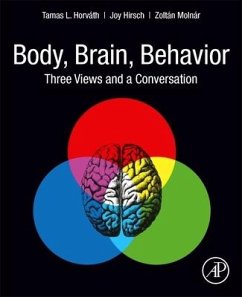Body, Brain, Behavior: Three Views and a Conversation describes brain research on the frontiers, with a particular emphasis on the relationship between the brain?and its development and evolution, peripheral organs, and other brains in communication. The book expands current views of neuroscience by illustrating the integration of these disciplines. By using a novel method of conversations between 3 scientists of different disciplines, cellular, endocrine, developmental, and social processes are seamlessly woven into topics that relate to?contemporary?living in health and disease. This book is a critical read for anyone who wants to become familiar with the inner workings of the nervous system and its intimate connections to the universe of contemporary life issues.
Hinweis: Dieser Artikel kann nur an eine deutsche Lieferadresse ausgeliefert werden.
Hinweis: Dieser Artikel kann nur an eine deutsche Lieferadresse ausgeliefert werden.

